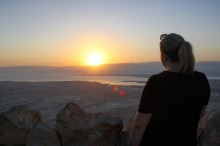Please excuse the cliché, but my Summer Abroad trip to Jerusalem this past July changed my life. I will try my best to spare you the sappy details, but it truly was a privilege to go out into the world, learn from people, and discover places beyond my small bubble. Of course, it didn’t hurt that my Instagram got to be on point during my travels (#summerabroad2016). Through a program called Coexistence, I was given the opportunity to travel to the Hebrew University of Jerusalem to study the Palestinian-Israeli conflict. As it would be impossible to recount my entire trip abroad in one article, I have chosen to reflect on three important phrases I learned and explain their significance to me.
The first important Hebrew word I learned while in Israel was todah (תודה) which means “thank you.” As a Canadian abroad, I knew this would be an essential, but todah became more than simply an expression of gratitude. It became the lens through which I began to view my travels. Israel and Palestine taught me to be grateful. I am grateful that organizations like the Parents Circle, which brings bereaved Israeli and Palestinian families together to talk about their tragedies and the political climate, exist. I am grateful to the gracious Palestinian people who were willing to share their stories of struggle and give us their perspective on the realities of living under occupation. I am grateful to the Israeli citizens who also opened their hearts and minds to us as they explained how they are working—albeit slowly—towards peace. While I do not wish to sugarcoat or to downplay the magnitude and gravity of this conflict, I would like to remind you that on both sides of this conflict there are people, and these people are trying to find some semblance of peace in this difficult situation.
On my first trip into the West Bank, I learned the Hebrew and Arabic word yalla which usually means “hurry up” or “let’s get going,” from our guide. When travelling, it can often feel like one is rushing to tick off all of the “must sees” on their travel to-do list. However, this pace would not have felt appropriate while walking the streets of the ancient cities of Ramallah and Bethlehem. Instead of simply going through the motions on this trip, I attempted to make a conscious effort to be present and to take in all of the sights and sounds—particularly when we were meeting with different groups and individuals, ranging from the members of the Israeli Knesset to delegates in the United Nations, from the refugees staying in camps inside the West Bank to the street falafel and hummus vendors; I wanted to truly engage. This was often difficult, as many of the things I witnessed were disheartening. At times, I reflected on the strange voyeurism of some of our excursions. Here I was a “conflict tourist,” otherwise known as a student, who was so easily able to leave this area, gawking at people displaced by an inexplicably complicated conflict. The tragedy, pain, and suffering of conflict became much more difficult to confront when I could not hide behind an international relations textbook or in-class lecture slides.
That brings me to what was perhaps the most personally significant Hebrew phrase I learnt while in Israel: Yad Vashem. Yad Vashem, which is actually the name of the World Holocaust Remembrance Center, is generally translated as the Museum of Martyrs. The masterfully curated museum housed at the remembrance center depicts a journey through the horrors of the war and ends outside on a balcony overlooking Jerusalem in the light. While I knew that I would be moved by this, I was far more emotionally affected than I had anticipated.
In the 1940s, my sixteen-year-old grandfather was taken with many other Hungarian Jews and prisoners of war to work in the copper mines of Bor in Serbia. Amazingly, he escaped with his best friend from Budapest, and they survived the rest of the war by hiding with Serbian families and working as shepherds. Sadly, my great-grandfather, Leo Lendvai (Waldmann) was murdered in the Shoah (Holocaust) at Auschwitz-Birkenau. According to my grandfather, my great-grandfather tossed a note from the train en route to the concentration camp with his name and address. Miraculously, the note was sent back to Budapest which is how his family knew he had been deported.
The most powerful part of the museum is the Hall of Names, which is a memorial to each and every Jewish person who perished in the Holocaust, including my great-grandfather. The circular room houses short biographies of about 1.5 million victims. This is where I truly felt the weight of my history; here was the account of my great-grandfather’s death, and here were the stories of so many Jews who had suffered. I was confronted by the fact that if my grandfather had not escaped his forced labour camp I would not exist today; and by how strange, terrible, and wonderful the world can be. Remembering is painful, but it is important. In the words of the late author and Holocaust survivor Elie Wiesel, “Because I remember, I despair. Because I remember, I have the duty to reject despair.”
To put it lightly, my eye-opening travels in Israel and Palestine challenged me both intellectually and emotionally. There is no easy answer to this conflict; the more I learned, the more questions I had, and the less answers could be given. What this trip did teach me is that conflicts involve people, and it is incredibly important that we listen to and appreciate the narratives of these people. As Rami Elhanan of the Parents Circle, whose fourteen-year-old daughter was killed by two Palestinian suicide bombers, poignantly stated during our discussion, “We do not ask you to be Pro-Israel, and we do not ask you to be Pro-Palestine. We ask you to be pro-peace.”
This article was originally published in the Salterrae: www.issuu.com/salterrae.


